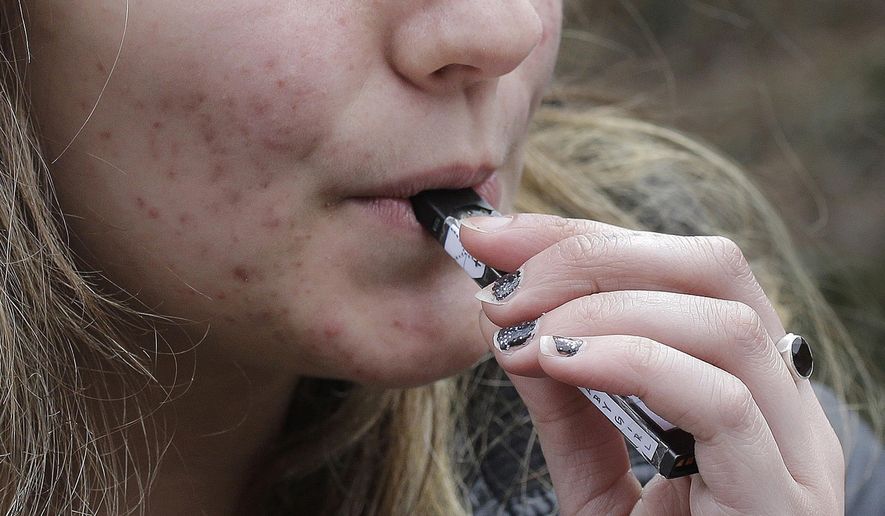Last week, Food and Drug Administration Commissioner Scott Gottlieb announced he would resign at the beginning of April. On his way out the door, he has finalized the draft of a new federal regulation on vaping that appears to do the opposite of what it promises.
Last September, Dr. Gottlieb declared war on an epidemic of youth e-cigarette use.
Just two months later, after meeting with the five biggest companies producing electronic nicotine delivery systems, or ENDS, he announced a drastic proposal to curb youth access to vapor products. Most notably, Dr. Gottlieb called for major restrictions on the sale of flavored vapor products, allowing them to be sold only in “age-restricted locations” (i.e. vapor shops where one must be 18 years old to enter), or separate age-restricted sections of existing retail locations (think the X-rated section of a video rental store in the ’90s).
This heavy-handed overregulation will discourage adult smokers from quitting deadly tobacco products, and punish gas stations, convenience stores and other retailers by making vapor sales cost-prohibitive, moving that revenue to underregulated vapor specialty shops. And, in an interesting twist, Dr. Gottlieb’s proposal protects the revenue and market share of JUUL, by far the largest vapor company in the market, at the expense of its competitors. JUUL, unsurprisingly, supports the regulation.
Why would the Trump administration advance a job-killing crony capitalist proposal that will deprive smokers of the right to choose the smoking cessation tool that is best for them?
Dr. Gottlieb is pushing his proposal inside the White House as his last act as FDA commissioner.
President Trump and the next FDA head should reject this corporate welfare once and for all.
Here’s the reality: ENDS products have been proven to be highly effective smoking cessation tools; a fact Dr. Gottlieb fully acknowledges.
In January, he admitted, “At face value, we believe these [vapor] products pose less risk than combusting tobacco. If you can fully switch every currently addicted adult smoker who is using combustible tobacco products onto e-cigarettes, you will have a profound impact on public health. And some people are able to switch completely. We think that is a public health benefit.”
Under the Gottlieb plan, all flavored ENDS products except for tobacco, menthol and mint flavors must be sold in an age-restricted (18+) location, such as a vape shop, or in a special age-restricted section of an existing retailer. All online sales of flavored ENDS products will be subject to heightened age verification.
The plan also seeks to remove ENDS products that are marketed to youth, vaguely defined by FDA thusly: “This could include using popular children’s cartoon or animated characters, or names of products favored by kids like brands of candy or soda.”
Dr. Gottlieb says there’s a need to balance the “off-ramp” that ENDS products provide smokers against the “on-ramp” the products make available to youths.
He justifies this regulation by citing data found in the 2018 U.S. National Youth Tobacco Survey. But the data is incomplete and justifies nothing.
The study shows an increase in youth vaping but provides no data on the incidence of youth smoking. This is a key statistic that is completely omitted. If vaping increases as youth smokers migrate away from combustible cigarettes, that’s an incremental positive step for public health.
The study shows that the vast majority of flavors preferred by youth vapers are the flavors being exempted from the Gottlieb rule. At least 83.4 percent of youth vapers are using tobacco, menthol or mint-flavored ENDS. Why is Dr. Gottlieb exempting those flavors in the name of preventing youth e-cigarette use?
The net effect of the Gottlieb plan is that it will drive flavored vapor products — many of which are preferred by adult e-cigarette users — out of the retail locations where adult smokers are most likely to encounter them.
The requirement that gas stations and convenience stores build new structures to shield youths from accessing — or even seeing — flavored vapor products will be cost-prohibitive.
Smokers who might otherwise migrate from traditional cigarettes to much safer flavored vapor products simply will not seek them out in a dedicated vape shop. Those who have already migrated from cigarettes to flavored vapor are highly likely to switch back to cigarettes full-time for convenience.
The Gottlieb plan assumes that age-restricted vape shops are highly effective at keeping youth customers out, and scrupulous about not selling to underage buyers. Not only does FDA provide no data to support this, but the available data actually goes against this assumption.
Here’s another major problem: Allowing mint-flavored e-cigarettes is a massive loophole. Vapor titan JUUL makes the majority of its revenue from the sale of its mint-flavored pods.
The ’mint’ carve-out is crony capitalism at its worst, where the rich get richer by securing harmful regulations on their competitors only to profit themselves.
Overregulation and crony capitalism are to be expected in a Democratic administration. The Trump White House and the next Senate-confirmed FDA commissioner must repeal this regulation. It makes the situation worse, not better.
• Matt Mackowiak is president of Austin, Texas, and Washington, D.C.-based Potomac Strategy Group. He’s a Republican consultant, a Bush administration and Bush-Cheney re-election campaign veteran and former press secretary to two U.S. senators.
• Matt Mackowiak can be reached at 654321@example.com.




Please read our comment policy before commenting.